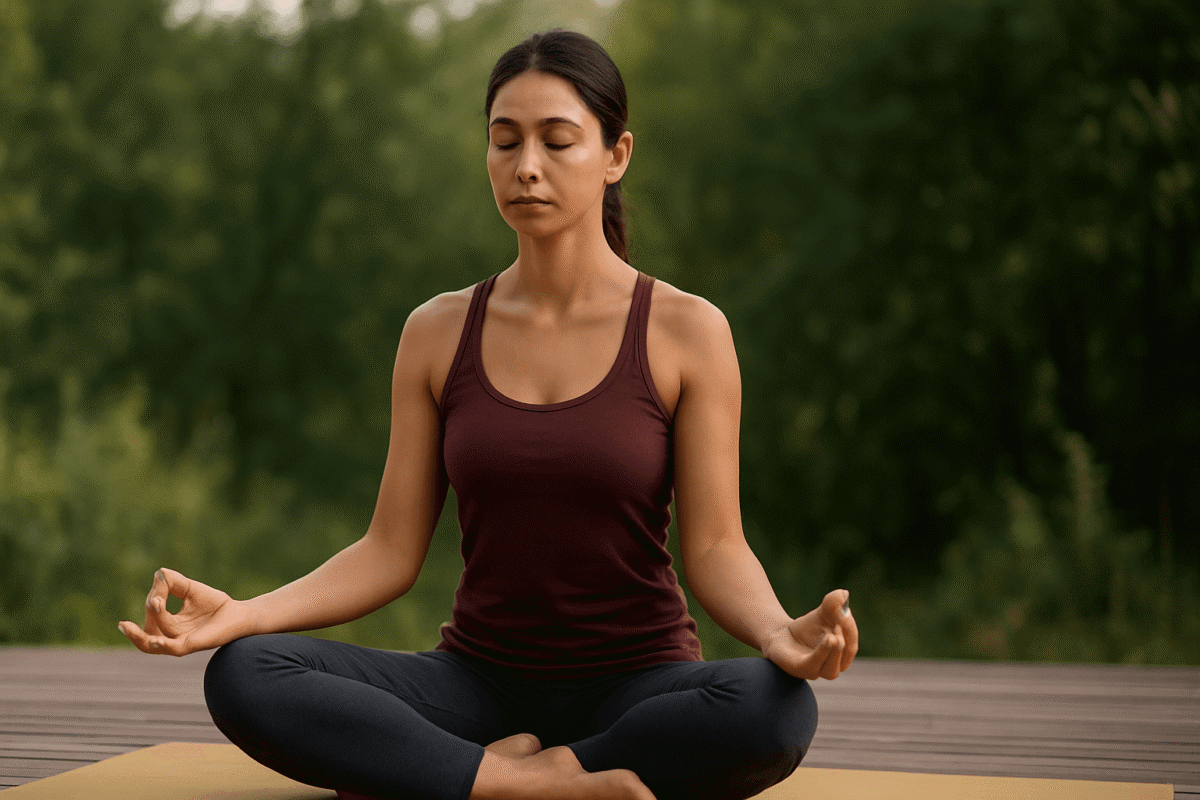In our fast-paced world, it’s easy to forget the importance of slowing down and turning inward. Yoga for self-discovery offers a powerful practice, allowing us to connect with our true selves, understand our emotions, and find clarity in our lives. Through yoga, we gain a deeper understanding of our thoughts, feelings, and purpose, which guides us toward a more authentic way of living.
Yoga teaches us to observe ourselves without judgment, fostering a sense of self-awareness that reaches every part of our lives. It is a journey of self-knowledge, helping us detach from external influences and discover who we truly are at the core. In a world filled with distractions, yoga for self-discovery provides the space to explore our inner selves and awaken to a more genuine version of who we are.
The Mind-Body Connection: Unlocking Self-Awareness Through Yoga
One of yoga’s most powerful aspects is its ability to create a strong mind-body connection. As we practice yoga, we engage both the body and the mind in harmony. Every movement, breath, and posture works to align the physical body with the mental state, encouraging balance and clarity. This holistic approach helps us become more aware of our inner world, nurturing deeper self-awareness.
Yoga postures (asanas) are more than exercises; they serve as opportunities for self-reflection. As we hold each posture, we are invited to notice our sensations, emotions, and thoughts. Are we holding tension? Do we feel discomfort or resistance? How do we respond to these sensations?
These moments of self-observation offer valuable insights into our habitual patterns and emotional blocks, which are key elements in unlocking deeper self-awareness. Moreover, this conscious engagement with our bodies teaches us to recognize when we’re pushing too hard or when we need to rest. Research from Harvard Medical School confirms that regular yoga practice strengthens this mind-body connection significantly, with brain imaging showing improved cognitive function and emotional regulation.
Yoga for Self-Discovery: Emotional Healing and Release
Yoga is an incredibly transformative tool for emotional healing. Many of us carry emotional baggage—past traumas, unresolved feelings, or stress—that manifests in the body. Yoga for self-discovery offers a safe space to release these pent-up emotions, allowing us to process and heal on a profound, cellular level.
As we move through various asanas, we create room in the body to release stored emotions, leading to emotional balance and well-being. For instance, hip-opening poses often trigger emotional releases because we tend to store tension and trauma in our hips.
Practices such as restorative yoga or pranayama (breathing exercises) are particularly effective in calming the nervous system and alleviating emotional distress. Mindfulness within yoga helps us understand the emotions that arise, whether they stem from past experiences or current challenges. Rather than avoiding or suppressing these emotions, yoga encourages us to embrace, process, and ultimately release them.
This emotional release is liberating, allowing us to move forward with greater emotional freedom and clarity. Yoga’s healing power helps us reconnect with our hearts, promoting self-compassion and acceptance along the way. Additionally, regular practice creates a consistent outlet for processing emotions before they become overwhelming. Studies published in medical journals show that yoga significantly reduces symptoms of anxiety and depression through improved emotional regulation and stress reduction.
Cultivating Inner Peace and Mindfulness
Yoga is deeply intertwined with mindfulness—the practice of being fully present in the moment. In yoga, we are encouraged to focus on our breath, movements, and sensations. This conscious awareness cultivates inner peace as we let go of external distractions and attune ourselves to our inner world.
Mindfulness in yoga extends beyond the mat. The skills we develop—such as concentration, patience, and presence—carry into our everyday lives. As we become more mindful, we foster a sense of calm and clarity, regardless of external circumstances. Yoga teaches us to be present with whatever arises, without judgment or attachment.
Through this practice of mindfulness, we become more aware of our thoughts, emotions, and reactions. We start noticing when our minds become clouded with negativity or worry, and we gently bring ourselves back to the present moment. Furthermore, this ability to redirect our attention becomes a powerful tool for managing stress and anxiety in daily life.
Over time, this mindfulness practice nurtures emotional stability and inner peace, both of which are vital for self-discovery. In fact, many practitioners report that their yoga practice helps them respond to challenges with greater equanimity and wisdom.
Using Yoga for Self-Discovery and Self-Acceptance
Self-acceptance is one of yoga’s greatest gifts. In a world that often promotes comparison and judgment, yoga for self-discovery provides a sanctuary for self-love and compassion. Through our practice, we learn to accept ourselves as we are—embracing both our strengths and flaws.
Yoga’s non-competitive nature encourages us to focus on our own growth, rather than comparing ourselves to others. We are reminded that yoga is not about achieving perfect poses, but about being present with ourselves. As we practice with this mindset, we let go of perfectionism and learn to embrace the beauty of imperfection. This shift toward self-compassion and acceptance is a vital aspect of the self-discovery journey.
Yoga also teaches us to listen to our bodies and honor our limitations. Instead of pushing ourselves beyond our limits, we learn to respect our bodies’ signals, practicing within our range of motion. This approach promotes self-care and kindness, helping us build self-respect and trust in our abilities.
Moreover, this practice of self-acceptance on the mat naturally extends to how we treat ourselves in everyday situations. We become gentler with our mistakes and more patient with our learning processes. Research studies demonstrate that yoga practitioners develop significantly higher levels of self-compassion, mindfulness, and interoceptive awareness compared to non-practitioners.
Finding Purpose and Clarity Through Yoga Practice
Yoga for self-discovery is more than a practice for healing and self-awareness—it is a powerful tool for discovering one’s purpose and clarity in life. As we connect with our inner selves, we begin to hear our true desires, dreams, and aspirations. Yoga helps quiet external noise, allowing us to tune into our intuition and align our lives with our authentic values.
Whether through meditation, pranayama, or guided reflection, yoga creates space to explore our purpose. As we cultivate inner stillness, we access deeper clarity, empowering us to make decisions that reflect our true intentions. Therefore, many people find that regular yoga practice helps them gain perspective on important life choices.
For many, yoga becomes a spiritual practice, fostering a connection to something greater than oneself. This connection provides meaning and purpose, enriching our lives as we navigate life’s challenges. Additionally, this sense of connection can reduce feelings of isolation and increase our sense of belonging in the world.
Integrating Yoga into Your Daily Life
To fully experience the transformative benefits of yoga for self-discovery, it’s essential to make it a regular part of your life. You don’t need hours of practice each day; even a short session can bring profound benefits. Here are a few ways to incorporate yoga into your routine:
Start with a morning practice: Begin your day with gentle stretches, breathing exercises, or meditation to set a positive tone. Even five minutes of sun salutations can energize your body and focus your mind for the day ahead.
Take mindful breaks: Throughout the day, take short moments to practice mindfulness through deep breathing, stretching, or a quick yoga flow. These mini-breaks help reset your nervous system and maintain emotional balance.
End your day with relaxation: Close your day with a restorative yoga session or calming breathing exercise to promote relaxation and restful sleep. Practices like legs-up-the-wall pose or gentle twists can help release the day’s tensions.
By integrating yoga into your daily life, you create space for personal growth, healing, and self-discovery. The more consistently you practice, the more you will experience the transformative benefits of yoga, on physical, emotional, and spiritual levels. In fact, consistency matters more than duration—a daily 10-minute practice yields better results than sporadic hour-long sessions.
The Transformative Power of Yoga for Self-Discovery
Yoga offers a profound tool for self-discovery and personal growth. Through its mind-body connection, emotional healing, and mindfulness, yoga gives us the opportunity to explore our true selves in a nurturing environment. It teaches us to accept ourselves fully, embrace imperfection, and live a life aligned with our deepest values.
The transformative benefits of yoga for self-discovery extend beyond the physical body—they permeate every aspect of our being, offering insights, healing, and clarity. Whether seeking emotional balance, inner peace, or greater purpose, yoga can guide you on your journey of self-discovery.
By committing to this practice, you open yourself to profound transformation and genuine self-knowledge that will enrich every area of your life.

